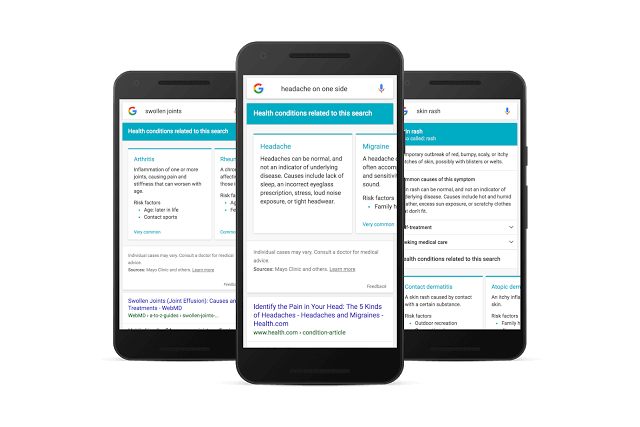Posted on 6/29/2016 in Digital Marketing
By Dean Dorazio
When you have a question, you go to Google. You have a health concern you go to…Google? That’s right, if you’re like so many people, you’ve probably asked Google why your stomach hurts.
As a matter of fact, 1% of ALL Google searches are symptom-related. With 1.2 trillion searches annually, that means Google fields over 10 billion health-related questions. That’s a lot of headaches!
Due to such a substantial volume of these search queries, Google announced on June 20[sup]th[/sup], that they have launched a new program, Google Symptom Search. As of now, the update is only available on mobile platforms and in English. Google does intend to include a wider search results and translate it to other languages eventually.
What Is Google Symptom Search?
Google Symptom Search is an update providing immediate answers about medical symptoms and conditions. Users will be able to search by symptoms and receive a list of health conditions as well as descriptions of those symptoms.
Let’s say you search “headache.” Google would pull up a list of reasons why you’d have pain in your head, like migraines or the common cold. In addition, it would describe different types of headaches, whether it’s throbbing or only on one side of your head.
You’ll have the option to click on a specific symptom and Google will provide you with a Knowledge Graph that goes more into more depth about the condition. You’ll also have information on how to treat it by yourself at your home or whether you should go and consult a doctor.
Why Did Google Feel the Need to Release This?
As we stated earlier, Google receives a staggeringly large amount of traffic related to health concerns. However, the results people received before Google Symptom Search were hard to understand. Users were directed to medical websites and forums that were full of unintelligible medical terms. Oftentimes, people would think their condition was far worse than in reality.
In their quest to improve user experience, Google wanted to make medical information more accessible to the public. They teamed up with Harvard Medical School and the Mayo Clinic to help pinpoint problems without needing a medical degree.
The biggest change in health searches is the use of laymen’s terms. Typing in something as simple as “tummy ache” will provide you with information you need. This isn’t intended to replace doctor’s visits, but to know when to schedule an appointment. Pertinent information will allow both the patient and doctor to know more and improve the recovery process.
[caption id="attachment_325" align="aligncenter" width="640"]

(Source: Google Official Blog)[/caption]
Will Google Symptom Search Affect SEO?
Since the update is brand new, we can’t say definitively how it’ll affect SEO. However, we can probably assume it’ll be good for health care providers. With people knowing whether or not they should consult their physicians, they’ll be receiving more appropriate leads.
As far as traditional SEO is concerned, it will not be much different than current practices. There is no specific way to target or influence the symptom search results. Following SEO best practices, including focusing of keywords, employing structured data, and generally providing quality content to users will benefit these websites.
Have Google’s updates got you and your company concerned? Are you interested in partnering with people who have years of experience and a solid foundation of holistic SEO? Contact Wakefly and learn how we drive digital success today.
Related Articles

Outdated or Outstanding? How to Tell If Your Website Needs a Refresh
Your website is the digital face of your business. It serves as a first impression, a marketing tool, and a resource for potential customers. [...]

Preparing a Website Redesign Budget for 2025: A Step-by-Step Guide
As we approach 2025, businesses are recognizing the necessity of a fresh, user-friendly website to stay competitive in a rapidly evolving digital [...]

Elevating Your Brand: The Transformative Power of Website Design
In the digital age, your website is often the first point of contact between your brand and potential customers. It's not just a platform to showcase [...]

